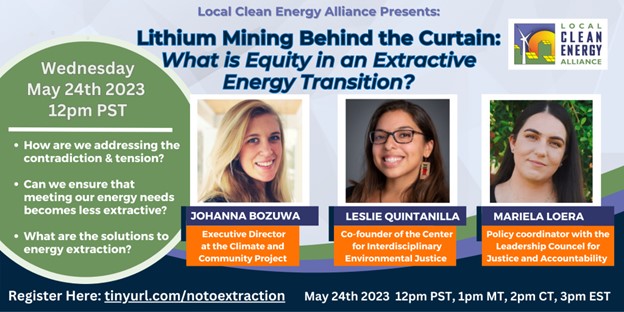SUBSCRIBE to
Local Clean Energy
News & Alerts
LCEA hosted webinar on Lithium Mining Behind the Curtain: What is Equity in an Extractive Energy Transition?
 On May 24, LCEA hosted a webinar: Lithium Mining Behind the Curtain: What is Equity in an Extractive Energy Transition with Johanna Bozuwa, Leslie Quintanilla and Mariela Loera on the lithium extraction implicit in the energy transition. We were joined by over 140 attendees spanning environmental and energy justice movements. This turnout points to the necessity and under-representation of resource extraction as a topic in our movement for energy democracy. LCEA looks forward to hosting and participating in many more of these conversations!
On May 24, LCEA hosted a webinar: Lithium Mining Behind the Curtain: What is Equity in an Extractive Energy Transition with Johanna Bozuwa, Leslie Quintanilla and Mariela Loera on the lithium extraction implicit in the energy transition. We were joined by over 140 attendees spanning environmental and energy justice movements. This turnout points to the necessity and under-representation of resource extraction as a topic in our movement for energy democracy. LCEA looks forward to hosting and participating in many more of these conversations!
You can watch the webinar at: https://drive.google.com/file/d/10gOOUx-gx3ROkmJjRRTritnwCVP6YP7T/view?ts=6489bcb0
To frame our discussion in the impact of lithium mining on frontline communities, Leslie Quintanilla shared a short film and stories from struggles against lithium mining in indigenous communities of Chile and Argentina who are protecting their land and water. Mariela Loera, who has worked with communities in Salton Sea region, expanded on how arguments are made to justify extraction there under the pretenses of “less intensive” mining practices, while there is still no commitment to shut down more intensive ones, and communities are still excluded from accessing technologies that use this lithium. Johanna Bozuwa specifically addressed the potential for solidarity along the supply chain and the potential that reconfiguring electrifying industries like transportation, to move towards public transit, walkable cities etc can have in reducing lithium demand.
We know that this conversation is only the beginning of a longer and necessary discourse about the tensions of moving to renewable energy, when these technologies are still premised on extraction, displacement of indigenous communities and destruction of land and water. The webinar finished with a call to build intersectional coalitions, center land and water in our work to meet community needs and ensure that where extractive energy technologies are used they benefit communities.
At LCEA, we are attempting to reckon with the contradiction presented by doing advocacy to ensure that local clean energy meets the needs of communities. This looks like local microgrids at community centers, libraries, health clinics or schools, energy efficiency and above all demand reduction. As we heard from three different perspectives in this webinar, in order to avoid simply replacing the dirty fossil fuel industry with its counterpart of mineral extraction, serious changes have to be made in how we think about using energy resources. With the understanding that all energy comes from extraction, we must get specific in the communities and community needs for which energy should be used. We encourage all of our allies in the fight for environmental justice to join us in empowering communities, building structures of energy democracy and continuing to have conversations about the contradictions of achieving equity in an energy transition that is still deeply extractive.
